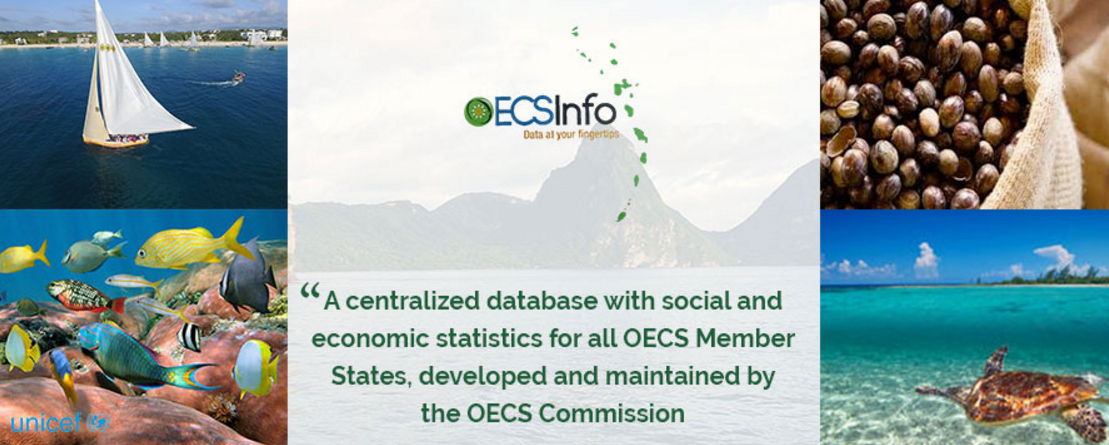OECS to benefit from new public statistics database
Web-based software provides easy to access regional social and economic data
Citizens of OECS Member States now have data at their fingertips with the launch of OECSInfo 2.0, a centralised database with regional social and economic statistics such as labour force indicators, population, education and inflation rates.
OECSInfo 2.0, launched on June 13th 2017, was developed by the OECS Commission as an adaptation of DevInfo, a dissemination tool created by the United Nation’s Children Fund (UNICEF). It is a one-stop, web-based tool that offers social and economic data for all OECS countries in one place and can be accessed by anyone, anytime and anywhere using the URL: www.devinfo.org/oecsinfo
Among the data that are available now are:
- Education;
- Juvenile Justice;
- Population;
- Unemployment;
- Tourism; and
- Gross Domestic Product (GDP)
The above data are available for specific Member States and the OECS Region (as a total), where applicable. Data will also be linked to the Sustainable Development Goals (SDGs).
Designed to provide data in a quick and palatable format, OECSInfo 2.0 has simple, user-friendly features that can be used to query the database and generate smart objects such as data tables, maps and graphs. These smart visualizations can be used to track trends, locate data and highlight data gaps - ideal for students’ assignments, media reporting, evidence-based planning, results-focused monitoring, and advocacy purposes.
OECS Director General, Dr. Didacus Jules, commended the newly accessible database saying it would prove indispensable for a wide cross section of users from senior policy makers to school and post-secondary students.
"The OECS Commission is pleased to launch this on-line database as a one stop portal to access quality, on-demand statistics for better informed decision making in our Member States — right across the sectors of education to tourism, as some examples.
The importance of statistics cannot be overstated as they provide more assurance in dealing with decision uncertainty; and we know uncertainty is the one constant that is going to increase in a rapidly evolving world, so I applaud the entire team for this achievement," Dr. Jules said.
At the opening ceremony of the launch, Dr. Gale Archibald, Head of the Statistical Services Unit at the OECS Commission, provided a brief account of the evolution of the database, from a desktop tool that was launched in 2009 to its current web-based adaptation.
Dr. Archibald also recognised the relevance of the OECSinfo tool in a world where we are used to visual content and receiving information quickly.
“We are excited that OECSinfo is web-based particularly for students because we want them to be able to access this data for assignments.
“We also want the media to have access so that when they produce stories they can have some visual and quantitative information.
“This tool is also useful for policy makers, we want them to have data - not only for their country but for the region - so that they can compare with other countries to see how they are doing,” Dr. Archibald said
Mrs. Muriel Mafico, Deputy Country Representative in the Eastern Caribbean Area for UNICEF, congratulated the OECS Commission on the realisation of a dream and commented on the timeliness of the tool.
“It could not have come at a better time — this is the right time,” Mrs. Mafico said.
“We are living in an age when we need to be evidenced based and evidence driven.”
“This is what OECSInfo will help us to do. It will give us data at our fingertips, which will help policy makers to make the right decisions, at the right time, in the right place.”
Ms. Geraldine St. Croix, Project Coordinator of the Enhanced Country Poverty Assessment Project, also informed the gathering of the usefulness of the tool to disseminate multidimensional poverty data.
Ms. Abiola Sandiford, Information Officer in the Statistics Services Unit, provided a live demonstration of the web-based software and pointed out that OECSInfo will serve to reduce the number of data requests received by the Commission and the National Statistics Office in each of the OECS Member States.
The Commission’s plans include integrating OECSInfo 2.0 with Geographic Information System (GIS) technology to combine traditional statistical data with geospatial and Earth observation data. This revolution will support an unlimited number of levels of geographical coverage, from the country level down to parish/district and village/community levels. This feature will afford a far richer data picture for users and policy-makers in particular. Upcoming promotion and advocacy events for the database include a road show and the presentation of OECSInfo 2.0 to students during OECS Statistics Week.
The launch of the OECSInfo2.0 database was held in the training room of the University of the West Indies Open Campus in St. Lucia. The ceremony took the form of a working session where, following a demonstration, persons in attendance were encouraged to ask questions and test the system on computers made available.
In attendance were staff of the OECS Commission, representatives from UNICEF, the St. Lucia Central Statistics Office, the Ministry of Finance and the Sir Arthur Lewis Community College.
The DevInfo project was funded by UNICEF with implementation support from Caribbean Development Bank and the CARICOM Secretariat's Regional Statistics Programme. The launch of OECSInfo2.0 was also funded by UNICEF.











